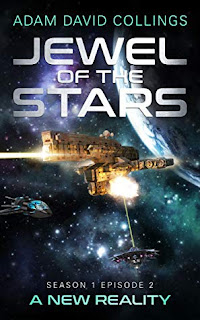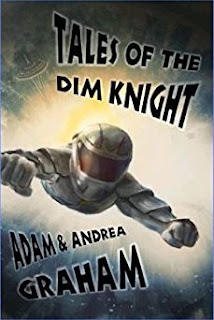Two weeks ago, I released my science fiction novella, Jewel of the Stars into the world. This book is the first in what will be a long-running episodic series. In this post, I go over some of the strategies I used when releasing this book, and some of the things I have learned.
Platform
My primary marketing strategy for releasing this book was to let those in my platform known about it. I have been steadily building my platform for a number of years. My primary tool for this has been youTube. I have tried various different types of video programming, but the format that has brought me the most success so far has been my monthly Christian Science Fiction and Fantasy Bulletin. This was a niche with a passionate following, that wasn’t being served on youTube. A large part of this success was the discovery of the Realm Makers Consortium.
I had also become a part of a number of valuable Facebook groups. The previously mentioned Realm Makers group, along with a science fiction themed group - Sci-fi Roundtable, and, of course, Christian Writers Downunder. I posted announcements of the book with a gentle sales pitch in each of these. I had previously established, through spending time in these groups, that they were open to, and encouraging of self-promotion. I also posted about it on the Christian Geek Central forum, where I've made some good friends. I was rather blown away by the outpouring of encouragement and support. I made 15 sales in that first day, due to this promotion.
Most of my existing platform was made up of Christians, in particular, Christians who are fans of science fiction and fantasy. This is a group of people that I am very comfortable around. They are “my people”. This book was not a specifically Christian book. Rather, it was written for the general market, although there is a Christian character among the ensemble cast, who can serve as the mouthpiece for my worldview, from time to time. Writing a book with crossover appeal to both Christian and General markets is a challenge. It’s early days yet, but so far, it seems to be doing well in both camps.
I was offered an interview by Author Eric Klein, from the Sci-Fi Roundtable. This wasn’t planned, just a case of being in the right place at the right time. This is why I love author communities. Everyone is always so willing to help each other. There’s something beautiful about our industry in that regard. We don’t have competition, just fellow adventurers on the journey.
I capitalised on my youTube audience by making an announcement trailer for the book.
Pre-Order
Once I’d settled on a release date, I had to figure out when to click the publish button on KDP. Amazon advises that publication can take up to 72 hours. In practice, it never seems to take that long. I have planned to use a pre-order so that the book would go live at exactly the time I had advertised. I realised, however, that you need to give approx 1 week’s notice (I don’t remember the exact number of days). I’d left it too late so I couldn't use the pre-order feature. Instead, I pushed the button mid-day the day before advertised release. The book went live late afternoon. Did it matter that it was live a little before I had advertised? Probably not.
The lesson here was, if you want to use pre-order, make sure you set it up early enough. Also, note the pros and cons of Amazon Pre-orders (which are different to pre-orders on other stores.)
Format and Price
Novellas lend themselves beautifully to the eBook format. My plan is to collect 6 episodes into a “box set” which I will release as a paperback, but for this launch, I concentrated on eBook only.
I chose the 99 cent price point to encourage initial sales. I created scarcity by being honest that I planned to raise the price to $2.99 after one week (which I did). One commenter on a Facebook group said “for 99 cents I’ll risk it”.
Review Copies
I offered free advance review copies to my mailing list a week before release. Four people took up this offer. Within a week of release, I had a couple of reviews on both GoodReads and the Amazon sales page. Had I been more organised, I would have sent these out a little earlier, to give reviewers more time.
One of these advanced reviewers was a strong influencer in the world of Christian Sci-fi and fantasy. Not only did he write a great review, but also provided me an Author / Novel Spotlight on this website.
Cover and Blurb
If you want to sell books, a great cover and blurb are essential. I commissioned a custom cover from Inspired Cover Designs and was thrilled with the result. I actually delayed publishing for a few months so I could save up for this. That said, I found the price very reasonable. If I’d had a larger budget, I might have purchased a blurb from Bryan Cohen’s Best Page Forward. Since I didn’t have the money for that, I read Bryan’s book How to Write a Sizzling Synopsis, and followed his recommendations and forumula.
Other Media
In preparation for my release, I took a big step. I contacted one of my favourite podcasts, Lasers, Dragons and Keyboards. The hosts of this show interview speculative fiction authors, usually Christians. I gently, but confidently, asked whether they would consider interviewing me on their show. They were happy to have me and an interview is in the works. The lesson here is don't let imposter syndrome hold you back. Ask (in an appropriate way). The worst they can say is "no," but they might say "yes".
I also submitted a short story, set in the same universe as the book, to the Untold Podcast. This podcast plays audio versions of speculative fiction from a Christian worldview. I was told that my story had been added to a fairly long list, so it may take some time before anything happens with this one. When it does, that’s another magnet that may draw readers into my book. The big lesson here is that I should have submitted it much earlier. Ironically, I deliberately held off submitting for a while, because I wanted to ensure that my book was published by the time the episode went to air (assuming it would be accepted), so as not to waste the marketing opportunity. Timing is everything, and it can be very difficult to work out your first time around, as you have no previous experience to draw on.
Wide vs Exclusive
I’m a big believer in publishing wide. I’ve been on the unfortunate receiving end of exclusivity many times in the past, when I wanted to buy something, but was unable. My long-term plan always has been, and always will be, to publish widely in all available places, so that readers can find my books in their preferred store, to read on their preferred device.
All of that said, I made the very difficult decision to launch the book into Kindle Unlimited (which requires exclusivity on Amazon) for a period of time.
My reasons for this were:
- Even Joanna Penn, a big proponent of publishing wide recommends staying in KU until you have at least three books, as that’s when you can start having success in the other stores.
- Space Opera is known to do well in Kindle Unlimited.
- I hoped to raise a little extra money through KU page reads to help fund editing and cover design costs for book 2.
- As I don’t yet have a fan base to disappoint, this is the best time, if ever, to try KU,
I haven’t decided exactly when I will make the transition to wide. It may be after my initial 3-month term is up, or I may wait until I have another 1 or 2 books in the series, but it may be expedited if people start asking for the book on other platforms.
Paid Advertising (or lack thereof)
I haven’t used any paid advertising while releasing this book. The real benefit of this type of promotion comes when you have multiple books available in a series. You may make a loss while advertising book 1, but you’ll make up for it down the track with sales on books 2 and 3. Once I have a few more episodes out in the world, I will begin to look into Facebook and Amazon ads. For now, though, I’m just leaving that one alone.
Mailing List
At the time of release, I had a mailing list of 28 people. I placed notices at the beginning and end of the book, inviting readers to receive a free prequel story, to get additional background to the events of Jewel of The Stars. As a result, I gained an additional 7 subscribers.
What's next?
All that I've done so far has been a 'soft launch'. I haven't yet held any kind of official launch event. The plan was to have a Facebook party, which I haven't yet organised. I may still do this, but I'm wondering if it will reach any additional people that haven't already been reached. Still, they say readers need repeated exposures to a book before they'll take the plunge and click buy. Above all else though, my focus now needs to be on getting the second book ready to ship. The longer the time between releases, the more likely I'll lose the interest of readers who would otherwise progress to subsequent books in the series.
Result
As you can see, from the KDP graph below, I had a release day spike of 15 books, selling 28 in the first 3 days. After that initial spike dropped off, I have continued to sell one or two copies every couple of days. In addition, the book has been read twice on Kindle Unlimited.
I’m thrilled with this result. Sure, we’re talking little numbers here, but for an unknown author, with only one novella in the series, it’s a confidence-building start.
It's been exciting to see some of the strategies I've heard about for so many years begin to work for me, in a small way. I didn't pick up hundreds of email subscribers, or sell thousands of copies, but writing is a long-term game, and for me, the adventure is just beginning.
What strategies have you found helpful when releasing a book?
About Jewel of The Stars
Haylee was more confident designing starships than raising an autistic child. She just wants a relaxing holiday with her family. But when Earth falls to an alien armada, she knows life will never be the same again.
Les was just a cruise ship captain. Now, he must rise up and become something greater, if he is to keep his crew and passengers alive.
Braxton never wanted to leave the space navy, but now, taking a cruise is the only way to feel the stars around him. This crisis may be his ticket to regaining the life he thought was gone forever.
Can they overcome their differences and save everyone on the ship?
If they reach unexplored space, they might yet survive, but an unstoppable enemy stands in their way…
Adam David Collings is an author of speculative fiction. He lives in Tasmania, Australia with his wife and two children. Adam draws inspiration for his stories from his over-active imagination, his life experiences and his faith.
Adam is a great lover of stories, enjoying them in books, movies, scripted TV and computer games. Adam discusses these on his own youTube show –
Stories with Adam Collings.
Find him at
adamdavidcollings.com or sign up to his
email list for a short story.


















































